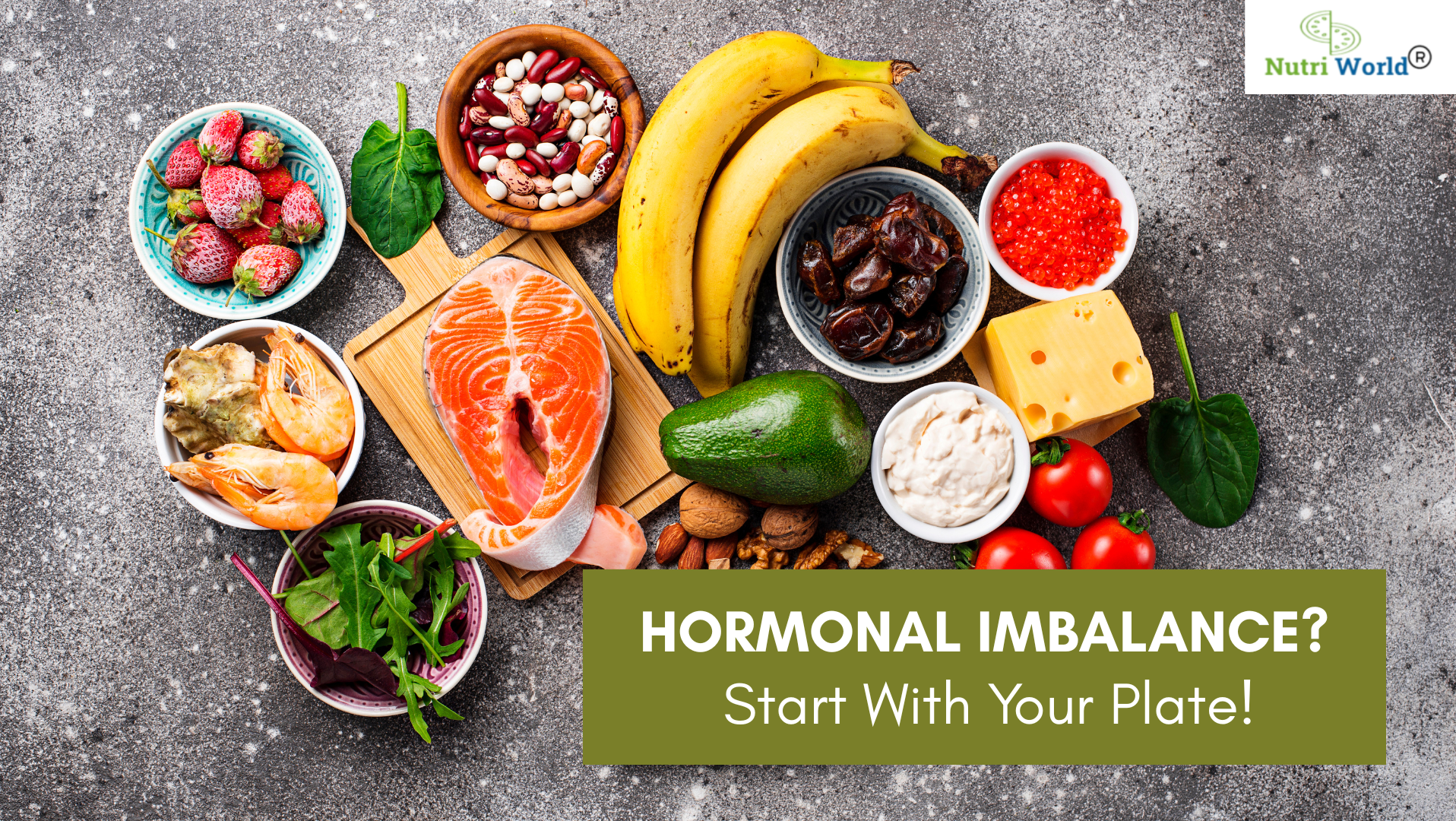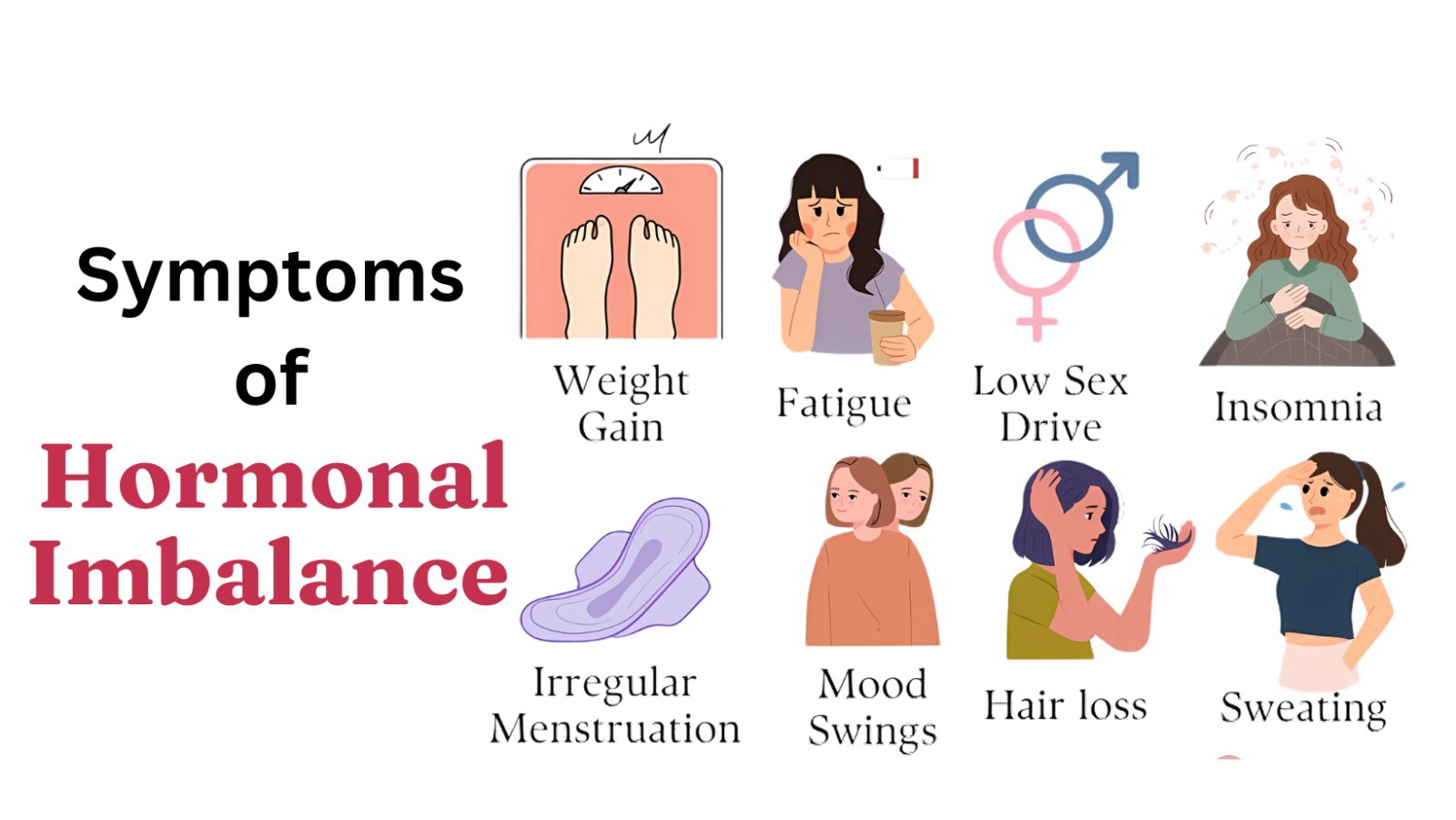By Nutriworld | Dt. Dipanwita Saha
Hormones play a vital role in keeping your body healthy and balanced. When hormones get out of sync, it can affect everything from your mood to your metabolism. The good news is that the food you eat has a big impact on how your hormones work. By choosing the right foods, you can help restore balance and improve your overall well-being. Starting with your plate is an important step toward better hormonal health.

Understanding Hormonal Imbalance: What’s Really Going On Inside Your Body?
Hormones are natural chemicals made by glands that send messages through your blood to control many body functions like hunger, sleep, mood, energy, growth, and menstrual cycles. When hormones are balanced, your body works well. But sometimes, hormone levels can be too high or too low — this is called hormonal imbalance.
Common causes of hormonal imbalance:
- Stress
- Poor diet
- Lack of sleep
- Medical conditions
- Changes like puberty, pregnancy, or menopause
Signs of hormonal imbalance:
- Constant tiredness
- Sudden weight gain or loss
- Anxiety or mood swings
- Irregular periods
- Changes in skin or hair
The Food-Hormone Link: How Your Diet Impacts Hormonal Health
What you eat has a powerful impact on your hormones. Just like a car needs the right fuel to run properly, your body needs the right nutrients to keep hormones balanced. Hormones are made from proteins, fats, and other nutrients, so when your diet is lacking in these essentials, it can lead to imbalances.
Healthy Fats for Hormone Production -
Good fats like omega-3s (found in flaxseeds, walnuts, and fatty fish) support the production of hormones such as estrogen and progesterone, helping to keep your cycle regular and mood stable.
Protein to Regulate Hunger Hormones-
Protein-rich foods like eggs, lentils, tofu, and dairy help your body make hormones and manage hunger by controlling insulin and ghrelin levels.
Fiber Supports Gut and Estrogen Balance-
Fiber from fruits, vegetables, and whole grains feeds good gut bacteria, which plays a key role in balancing hormones, especially estrogen.
Foods That Disrupt Hormones-
Too much sugar, refined carbs, processed food, caffeine, and alcohol can raise insulin, trigger inflammation, and disturb stress hormones like cortisol.
Top Foods That Help Balance Hormones Naturally
Here is a list of foods that help in balance hormones naturally
1. Flaxseeds- Rich in omega-3s and lignans, flaxseeds help balance estrogen levels and support a healthy menstrual cycle.
2. Leafy Greens- Spinach, kale, and methi are full of fiber and antioxidants that support liver health and hormone detox.
3. Avocados – Packed with healthy fats, avocados help in hormone production and reduce stress hormones like cortisol.
4. Eggs –Eggs are a great source of protein and healthy cholesterol, which is needed to make hormones like estrogen and progesterone.
5. Nuts and Seeds – Almonds, walnuts, sunflower seeds, and pumpkin seeds provide zinc, magnesium, and good fats that support thyroid and reproductive hormones.
6. Fatty Fish – Fish like salmon, sardines, and mackerel are rich in omega-3 fatty acids, which reduce inflammation and support hormone balance.
7. Fermented Foods – Yogurt, buttermilk, kefir, and homemade pickles boost gut health, which is closely linked to hormonal balance.
8. Whole Grains – Oats, brown rice, and quinoa are rich in fiber and B vitamins, which help manage blood sugar and support adrenal function.
These foods, when included regularly in your diet, can help keep your hormones balanced and your body functioning at its best.
Foods and Habits That Trigger Hormonal Chaos
Certain foods and daily habits can disturb your hormonal balance without you even realizing it.
Refined Sugar and Processed Foods -
Too much sugar and packaged foods can spike insulin levels, cause weight gain, and increase the risk of hormonal disorders like PCOS and insulin resistance.
Excess Caffeine and Alcohol -
High intake of coffee or alcohol can raise cortisol (the stress hormone), disturb your sleep cycle, and lead to hormonal imbalances over time.
Skipping Meals or Eating at Odd Times -
Irregular eating patterns confuse your body’s natural rhythm, affecting blood sugar levels and hormones like insulin and ghrelin (hunger hormone).
Chronic Stress-
Ongoing stress keeps your cortisol levels high, which can block the production of reproductive hormones and impact thyroid function.
Lack of Sleep -
Poor sleep affects melatonin and growth hormone production, and it can also raise cortisol and disrupt overall hormonal harmony.
Low-Fiber, Low-Nutrient Diets -
Diets lacking in fiber and essential nutrients don’t support proper hormone detox and can lead to estrogen dominance and poor metabolism.

Lifestyle Matters Too: Beyond the Plate
While food plays a big role in balancing hormones, your lifestyle habits are just as important. A healthy, well-balanced diet supplies the essential nutrients your body needs to produce hormones, while daily habits are equally important for keeping hormone levels in check. Together, your food and lifestyle choices form the foundation of hormonal health.
Here are a few lifestyle choices that also play a big role in maintaining hormonal health.
- Exercise Regularly – Physical activity helps manage insulin and reduces stress-related hormone imbalances.
- Prioritize Sleep – Aim for 7–8 hours of restful sleep to support hormonal repair and regulation.
- Manage Stress – Practice meditation, yoga, or deep breathing to lower cortisol levels and support reproductive and thyroid health.
- Limit Screen Time – Reducing exposure to blue light supports melatonin production and better sleep.
- Spend Time in Nature – Natural light and fresh air help reset your circadian rhythm, improving overall hormonal balance.
- Create a Routine – Consistent sleep, meals, and relaxation times keep your body’s internal clock in sync.
Both your meals and your daily habits work together to build a healthier, more balanced you.
Frequently Asked Questions(FAQ)
Q1: Can diet really affect my hormones?
Yes, the nutrients in your food directly influence hormone production and balance.
Q2:Which foods help balance hormones naturally?
Foods rich in healthy fats, protein, fiber, and antioxidants like flaxseeds, leafy greens, nuts, and fatty fish support hormone health.
Q3: Can eating too much sugar cause hormonal problems?
Yes, high sugar intake can spike insulin and cause inflammation, disrupting hormone balance.
Q4: How does stress affect hormones?
Chronic stress raises cortisol levels, which can interfere with reproductive and thyroid hormones.
Q5: Besides diet, what else helps maintain hormonal balance?
Regular exercise, good sleep, stress management, and a healthy lifestyle are essential for balanced hormones.
Conclusion:
Hormonal imbalances can affect many areas of your health, but the good news is that your diet has the power to help restore balance. Eating nutrient-rich, whole foods and avoiding processed items can support hormone production and regulation. By making mindful food choices, you take an important first step toward better hormonal health and overall well-being.
BY, DT. Sarika Tyagi
Qualifications – MSc in Nutrition & Dietetics , DDHN ,DNHE, diploma in Diabetic educator ,CFN , M.A in English , B.Ed.
